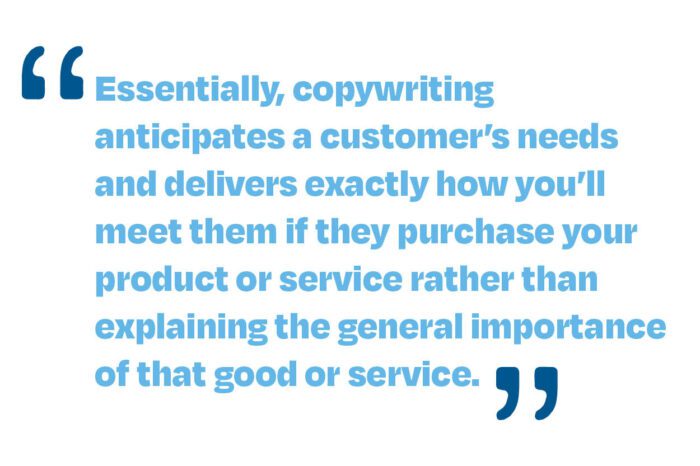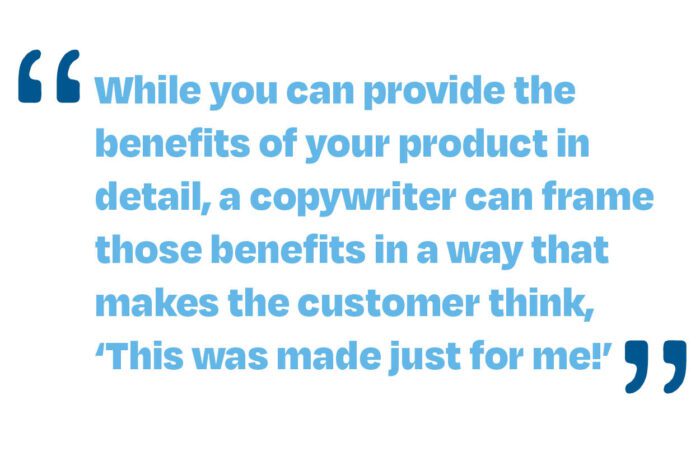In today’s content-driven world, the copy you write on your website and marketing matters. And while you’ve done a great job starting a business from your fresh ideas and incredible work ethic, that doesn’t mean you’re a writer too. That’s why, you need a copywriter!

Many business owners believe that writing is just a string of words together on a page, and how they arrange them doesn’t necessarily matter as long as they’re there. Besides, they’ve done everything else themselves; why can’t they write for their brand too? The truth is, copywriting is more nuanced than typing out a few sentences about your business; it requires the work of a wordsmith who can harness the power of language to make your business sound professional and engaging to persuade readers to take action.
A study by Conductor, a marketing optimization company, found that customers who read copy by a brand are 131% more likely to buy from them immediately after reading. A week after the study, 48% of those customers were still more inclined to buy from the brand they read about than others in the same market. This means correctly written copy has a lasting effect on its readers and benefits any brand far longer than its initial reading. That’s incredibly powerful when you think about it. With just one read-through of the copy on your site, someone is more likely to choose your brand over any other from that point and into the future.
This same study continued to prove the lasting effect of compelling copy when they followed up with participants later. They found that the time delay from the initial reading of the copy to their follow-up increased someone’s affinity towards a brand. They found that after a period of wait time, participants believed the brand they read about was 9% more trustworthy than after their initial reading and 8% more positive.
Now, we’re not saying you can’t write a good article for your blog or website, but writing copy that has this profound of an effect on readers takes skill and experience. This study by Conductor was on website copy written by copywriting professionals and what they referred to as “high-quality.” Meaning, not just any writing will do the trick.
So, you may be wondering, “What does a copywriter do that I can’t?”
What exactly is a copywriter?
Where a copywriter differs from someone who types something on their website, is their specialty in persuasive writing. They write compelling copy for things like product pages, landing pages, email opt-ins, social media posts, and anything else that directly intends to push prospects or current customers to do something.

Copywriters are specialists because that’s all that they do. They’re not juggling the ins and outs of running a business, managing employees, and writing. This intense specialization allows copywriters to hone in on the psychology of a buyer, which in turn gives them the tools they need to write about a product or business in a way that highlights the right benefits to the right people.
But, isn’t this the same as content marketing?
Great question! The phrase “content marketing” is a pretty hot topic these days, and the lines between this form of professional writing and copywriting can sometimes appear blurred to an untrained eye.
Copywriting, as we mentioned, is persuasive. The main goal is to convince the reader of something, whether buying a product, signing up for a consultation, or downloading an ebook. On the other hand, content marketing is more informational, providing your demographic with the guidance they may need to understand why your product or services are so important.
For example, let’s say you own a pool cleaning company. An example of effective content marketing would be a blog post or infographic on why having your pool cleaned regularly is essential. However, your landing page that offers visitors a discounted pool cleaning special if they sign up is an example of copywriting. The goal of this page isn’t just to inform the reader but to push them to sign up with your business.
Both types of writing are essential to grow a business, and sometimes the two do cross over. Still, the main difference is copywriting is persuasive, while content marketing is informational. One serves to position your business as an expert in whatever industry you’re in (like pool service). The other shows customers why they need your business in particular. Essentially, copywriting anticipates a customer’s needs and delivers exactly how you’ll meet them if they purchase your product or service rather than explaining the general importance of that good or service.

To highlight why this difference matters and help you understand why you need a copywriter, we want to share the specific ways a copywriter can benefit your business by filling in gaps you may not even know exist.
1. You’re Too Close To Your Business.
We know this sounds counterintuitive, but just stay with us for a second.
You’re obviously an expert in your business. You know the ins and outs of your product better than anyone, and you understand how it works and why you created it in the first place. And, you know the exact ways you’re better than the other guys, especially that one other guy in particular who is your biggest competition. So, when you describe your product or service to customers on your website, you may be inclined to include how your product is better than Mr. Other Guy’s, prattling on about the countless benefits it offers and the incredible ways you blow them out of the water.
But this information isn’t helpful to customers.
They want to know exactly how your product can soothe their pain points, not beat the other guy. And even if you just list the benefits of your product, like “longer battery life” or “lifetime warranty,” you’re still missing the point. Why does the longer battery life matter to customers? What issue does it avoid? How is a problem solved with a lifetime warranty?
A copywriter understands this is what your demographic is looking for. While you can provide the benefits of your product in detail, a copywriter can frame those benefits in a way that makes the customer think, “This was made just for me!”

2. Your Time Is Valuable.
Running a business is incredibly time intensive, and you likely spend most of your day managing the daily tasks that go with it. Suppose your hands are already full from running a company. In that case, you don’t have time to sit down and write highly-effective copy, especially if you’ve never done it before. In fact, it may take 3 to 4 times longer for you to write it than it would take a professional copywriter. That’s a lot of time sucked out of your already busy day.

So, why not save yourself time and effort? By hiring a professional copywriter, you’ll reap the rewards of increased sales and better search engine rankings without diverting any attention away from your daily tasks as a business owner.
3. Grammar Mistakes Matter More Than You Think.
We all can string a few sentences together and send them out onto the web, but understanding the nuances of grammar is a skill in and of itself, which is exactly why you need a copywriter. Because, while you may know the differences between there, their, and they’re, the overall quality of your spelling, punctuation, and grammar significantly impacts the success of your copy and business.
Cecile Scaros, a business and operations advisor, outlines the importance of grammar in business in 3 simple points.
- Grammar is a reader’s first impression — If your writing sounds unprofessional due to errors, you immediately lose respect from your readers as an authority figure in your market. Readers assume that anyone who knows their stuff can spell it too. Correct grammar, spelling, and punctuation give the reader confidence that you know what you’re talking about and can be trusted.
- Great grammar equals a better reputation — Just like readers are more likely to trust a company with better grammar, they’re more likely to believe that a business that uses correct grammar has earned its keep in the industry. Besides, how could they have made it this far if they couldn’t spell? Clear communication, free of errors, builds credibility and shows readers that your company views its interactions as sacred and worth taking their time on.
- Correct grammar avoids misunderstandings — When we learn to read as children, teachers use correct grammar, spelling, and punctuation models, whether that’s published books, textbooks, or lesson plans created by the teacher with a rigorous background in grammar themselves. All of this to say, we learned to understand writing best when it’s written correctly, and our understanding of what we’re reading drops dramatically when there are mistakes. So, when prospects check out your website to understand more about your product or service, bad grammar can confuse them about what you’re trying to say. And, as the saying goes, “A confused mind never buys.”
Professional copywriters avoid all of these points because, more often than not, they have degrees in various fields that require a mastery of grammar. Also, writers and editors usually flock together, and many pieces of professional writing circulate before a few experienced eyes before ever making it in front of a customer.
4. Professional Copy Can Increase Organic Web Traffic.
Organic traffic, or the number of times people come across your website naturally, is responsible for 53% of the clicks your website will receive. This is important for a few reasons. The main is that the more people visit your site, the more likely you are to generate viable leads and close sales.

A copywriter can tailor the content on your site to your demographic’s search preferences through keyword SEO. Then, once they’re on your site, their persuasive writing can keep visitors on your landing pages for longer and convince them to either sign up for a lead magnet or buy a product right there and then.
The Gist: Why You Need A Copywriter
Ultimately, a copywriter is a specialist who can help drive sales, engagement, credibility, and authority with your audience with a minimal time commitment required from you. And, if you’re still thinking that you can write copy for yourself with the same level of rhetoric and finesse, think of it this way: You probably don’t perform the maintenance at your building; you hire someone to ensure the space looks the best it possibly can at all times so when people view your business, it looks appealing to anyone considering stopping in. The same is true for a copywriter. They’re an expert who understands exactly what customers want to see when they view your landing page or product page, or read your email, so when they do, they’re more inclined to sign up for that lead magnet or press “add to cart.”
To put it bluntly, you’re an expert in your field, but not in every field. Sometimes it’s best to leave specific jobs to the experts who understand the best way to write copy that makes your demographic think you have read their minds. Besides, working with a copywriter may give you a better understanding of your market and their psychographics, which you can use in other areas of your business too. And remember, hiring a copywriter is just like hiring any other member of your team who brings a valuable list of skill sets that will ultimately make your business better because they’re there. If you’re wondering what’s next, we have the perfect tool for you. Once your copywriter creates compelling copy for your landing page or email opt-ins that push people to sign up for your lead magnet, you’ll need to nurture those connections so prospects either move down your sales funnel or previous customers choose to buy again if they have already. Our Nurture Report is full of expert tips, tricks, and strategies to foster your relationship with those warm leads once you have them. You can fill out the form below to download your free copy!


Recent Comments